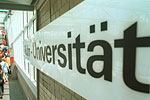|
Hertwig, Markus / Pries, Ludger / Rampeltsham-mer (Eds.) (2009): European Works Councils in complementary perspectives. Brüssel: ETUI
Hertwig, Markus / Pries, Ludger / Rampeltsham-mer (2009): Stabilizing effects of cross-border insti-tutions the case of the european works councils. Paper for the 17th GERPISA conference, Paris 2009
Hauser-Ditz, Axel/ Hertwig, Markus/ Pries, Lud-ger (2008): Betriebliche Interessenregulierung in Deutschland. Arbeitnehmerbeteiligung zwischen demokratischer Teilhabe und ökonomischer Effi-zienz. Frankfurt/M.; New York: Campus Verlag
Abel, Jörg / Ittermann, Peter (2003): Exploring the Boundaries of Co-determination. In: Walther Müller-Jentsch/Hansjoerg Weitbrecht (eds.), The Changing Contours of German Industrial Relations, München/Mering, pp.103-118.
Pries, Ludger / Hertwig, Markus (Hg.) (2005): Deutsche Autoproduktion im globalen Wandel. Altindustrie im Rückwärtsgang oder Hightech-Branche mit Zukunft? Berlin: Sigma.
Pries, Ludger (2003): Volkswagen in the 1990s: Accelerating from a Multinational to a Transnational Automobile Company. In: Freyssenet, Michel/ Shimizu, Koichi/ Volpato, Giuseppe (ed.), Globalization or Regionalization of the European Car Industry? Basingstoke/New York: Palgrave Macmillan, pp. 51-72.
Abel, Jörg/Pries, Ludger (2007): Shifting patterns of labor regulation: Highly qualified knowledge workers in German new media companies. In: Critical Sociology, Vol. 33, 101-125
Hauser-Ditz, Axel/ Hertwig, Markus/ Pries, Ludger (2006): Betriebsräte und "Andere Vertretungsorgane" Verbreitung und Kontext betrieblicher Beschäftigtenvertretungen in der deutschen Privatwirtschaft. In: Industrielle Beziehungen, Jg. 13, Nr. 4, S. 340-369
Pries, Ludger (2006): Cost competition or innovation competition? Lessons from the case of the BMW plant location in Leipzig, Germany. In: Transfer (Brussels), Vol. 12, No.1, S. 11-29
Pries, Ludger (2006): German Automobile Companies in the Americas: From passive local market suppliers to strong global players. In: Cardoso, Adalberto/Covarrubias, Alex (eds.), A indústria automobilística nas Américas: a reconfiguração estratégica e social dos atores produtivos. Belo Horizonte/Rio de Janeiro: Editora UFMG/IUPERJ, p. 219-24
|
